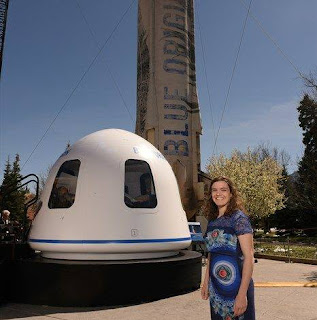By Therese Jones
I am often sent students who want to transition into the space industry, having converted from an astronomy Ph.D. program (Berkeley), to a policy Ph.D. program with a focus on space (RAND, a non-partisan think tank), then becoming Senior Director of Policy at the Satellite Industry Association. As a crash course in how to get started, I compiled this “Guide to the Space Life” to get students/young professionals up to speed on what it took me five years to figure out on my own! This post summarizes a few of the highlights of the document, but please see the full guide for more information.
Making the decision to transition out of astronomy was very hard, especially because I loved the people in the field. It turns out that people in the space industry are incredibly friendly and willing to go out of their way to support young professionals; many of the organizations and conferences listed provide great inroads into the industry. No experience in the space world? Not a problem—the Space Generation Advisory Council is an international organization of young professionals under 35 that hosts events in the US and abroad, sends out regular opportunities, and has working groups that you can join to work on different space issues. The Students for the Exploration and Development Space has chapters at colleges and even high schools, and supports a number of activities including rocket teams, satellite design projects, has an annual student-run conference, and is very well-connected to companies in the industry. No chapter at your school? You can also become an individual member or start your own chapter; they are great at supporting new chapters that are trying to get started!
The document also has a running list of conferences, many of which provide steep student discounts or scholarships. I personally created the American Institute of Aeronautics and Astronautics Diversity Scholarship, which fully funds 15-30 students from underrepresented groups to go to AIAA Space, SciTech, and Aviation meetings. Industry conferences are all about networking; the majority of my students from the Diversity Scholarship got internship/job leads or offers from attendance. Be sure to bring business cards and resumes if you attend!
Internships are key for getting into the space industry; while there is no centralized database of industry internships, and you have to search for individual companies, the document also contains a list of specialized programs related to the space industry. Though the application cycle has ended for 2019, the Brooke Owens Fellowship is a fantastic internship program for undergraduate women in space, and the Matthew Isakowitz Fellowship is a similar program open to all genders, both undergrad and grad students. Both provide placement at space companies and mentorship opportunities with senior leaders in the field; the cohorts of students I know who have participated have described the experience as life-changing.
Thinking about graduate school in a space-related field? I compiled a database of graduate fellowships that space-related graduate students are eligible for. I will note that in the industry, companies will often pay for you to go to school and get a master’s or even a Ph.D., so taking a break between undergrad and grad school works well for many people, and gives them time to figure out what area they would like to focus on.
My final words of advice for students interested in the space industry: 1. Try to do an instrumentation project, or work with a cubesat or rocketry team at your school—industry values out of class experience highly, and these projects will also make you a better astronomer if you decide to stay in the field, 2. Do an industry internship even if you think you want to stay in academia. It’s better to explore your options early, rather than commit 100% to academia and find yourself out of job options, 3. Do informational interviews, and schedule half hour calls with people at jobs you are interested in. LinkedIn is your friend for this! Be sure to: be prompt in scheduling/responses, send a thank you note afterward, and never directly ask for a job on the call. Being late and not following through are the top two mistakes I see students make; people will go out of their way to help you, but not if you are unreliable/don’t express appreciation for their time and effort. The industry is small, and people will remember you for better or worse.
Best of luck if you choose to enter the space [job] force, and please feel free to reach out with any questions!
